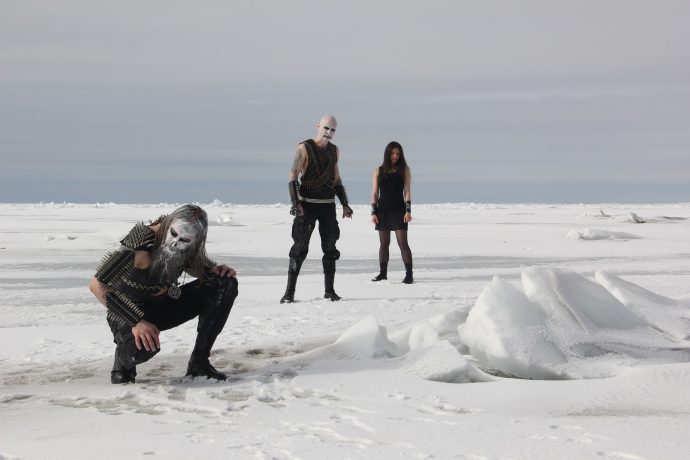
(We like to think that we’ve never published a “bad” interview, but of course some are better than others. The one below that Comrade Aleks brought us from his discussion with Para Bellum from the Russian band Blackdeath is one of the best ever. You’ll see.)
If we take into account the pre-Blackdeath projects Draugwath and Black Draugwath, then it’s easy to count that the band will reach its 30th anniversary in 2025.
For almost three decades, brothers Para Bellum (vocals, bass) and Abysslooker (guitars) keep on producing their own black metal with absolute dedication and some tendency to experiment, remaining one of the oldest Russian bands in this genre. With Maya on drums since 2007, this time Blackdeath enlisted the support of the second guitarist Der Nukleare Herjann (better known as Arjan Peeks), who spread the heathen malice through the Netherlands bands Cultus, Heimdalls Wacht, Uuntar, and more.
Naturally, an enhanced lineup produced the recording of a different kind, and the band’s eleventh album Mortui incedere possunt proves its firm position in the black metal underground. Even though Blackdeath never dealt with Lovecraftian beliefs directly, the interview with Para Bellum turned out great.
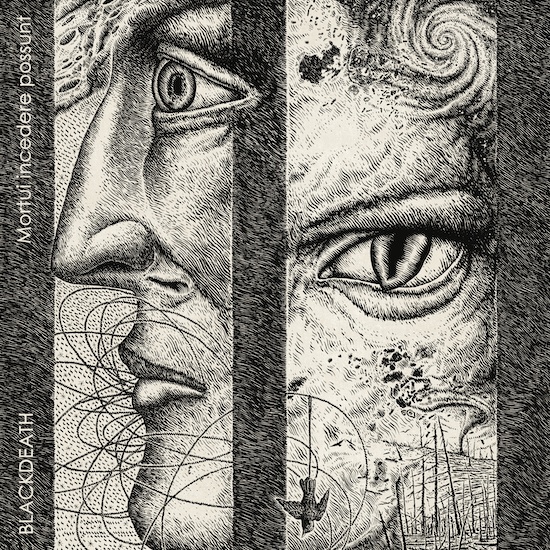
Hi Para Bellum! Accept my congratulations with the release of Mortui incedere possunt. Do you start this period of Blackdeath’s career with a release show or something?
Hi Alex, long time no see. Thanks for the congratulations. No, no fanfare, no firework, just a modest bottle of Chivas Regal in a friendly circle, that’s all. Of course, it was an emotional event for us, but there is no need to pay much attention to emotions. Over the years of our career, we have become accustomed to the fact that starting from a studio stage there is some slowdown at each stage of the new album release, but now due to external circumstances this was perceived more painfully. It would have been great to make a real celebration, but we are quite content with the fact that the release took place.
By the way, does any new album open a new period in the band’s career indeed? Or is it all just routine now?
It’s routine, judging by the fact that nothing has changed in our lives. We are working on material for the new album again, everything is as usual.
The previous Blackdeath work Also Sprach Das Chaos was released in 2021, and we had a good in-depth interview back then [here]. What happened in the band after that?
Maybe we could say that nothing happened. Take at least the fact that we performed live the songs from Also sprach das Chaos only four times. Well, we are not at all despondent, we used to our advantage the isolation Russia found itself in because of the permanent complex situation, both epidemiologic and political. The intense work on our new material was an exciting event for us, of course, but there was no intrigue in it for those around us, so it’s easier to say that nothing happened.
Are your rare gigs the result of the situation with metal gigs in Russia in general or did you lose interest in performing your material more often?
The first reason. We have not lost interest in performances.
The press-release says that Mortui incedere possunt is the debut of your drummer Polar Maya as vocalist. How did you come to this decision? Does it add a new undertone to your stuff? Honestly, I didn’t find a lot of female vocals in the album.
Well, we are not a doom metal or melodic black metal band to add female vocals to every song. Moreover, not every person can just up and start singing. This time Maya sings in three songs only, and she had to work hard for that, it was quite stressful for her. But that’s enough for starting I believe. The female vocals enhance a dramatic effect of the necessary passages, which was the main goal for us; this was just a consequence of the planning of the arrangement.
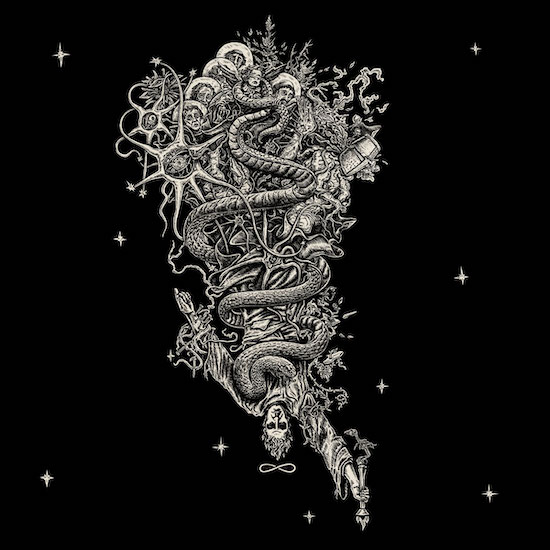
And she also performed great artwork for the album. It’s truly remarkable even though new albums appear every day almost. How long did you search for the artwork’s plot? And do you plan to produce some merch with it?
This time the cover concept was being searched for a very very very long time. We went crazy, several times it almost came to blows. Finally Polar Maya’s next masterpiece was inspired by Picasso’s painting “Woman sitting with crossed arms” (Femme assise aux bras croisés, 1937). A scene from the Oppenheimer movie with Cillian Murphy (that is, Robert Oppenheimer) looking at this painting in the museum served as a trigger.
Some time afterward I read somewhere that, according to one of the interpretations of this scene, by applying Picasso’s painting Christopher Nolan implies that the Chaos filled the scientist’s mind at that time. So the origin of our cover can be attributed to Chaos Magic. No, we don’t think it is really suitable for T-shirts; there are too many little details in the picture.
What about Der Nukleare Herjarnn, your new second guitarist? Is he officially in the band? Why did you decide to add an extra guitar to your arsenal?
Right, Arjan is officially a member of Blackdeath now. Arjan’s playing style is different from Abysslooker’s, so we thought that we could enrich our sound if we took a second guitarist for the recording. We’ve known each other and worked together for too long to invite him just as a session musician.
Does it mean that he also shares your views on black metal ideology and the attitude in general? His bands Cultus, Heimdalls Wacht, and Uuntar are about paganism, as I understand.
Well, he is also involved with German acts Pest and Omegavortex which are far from pagan ideology, especially the maniacal Omegavortex, but that’s not the point. He has quite extreme views on the stage and on life, and although our positions do not always coincide, we consider him to be our like-minded crazy person. And, oddly enough, I like his Cultus, I’m looking forward to the re-release of his Hymns of Descending album (2007).
Mortui incedere possunt has its old-school touch, but the complexity of compositions differs Blackdeath from the straightforward approach we are used to searching in the “old” bands. How do you see when the idea that you put into the core of the song is finally formed? How do you know when to stop?
I don’t think our songwriting process is any different from the general scheme. Except that we sometimes can’t see the formed idea until the very end of the act of creation. We stop when the song gives us complete satisfaction, when we don’t feel irritated in one section or another. By the way, this is very difficult to achieve, when there is a bloody democracy in the band.
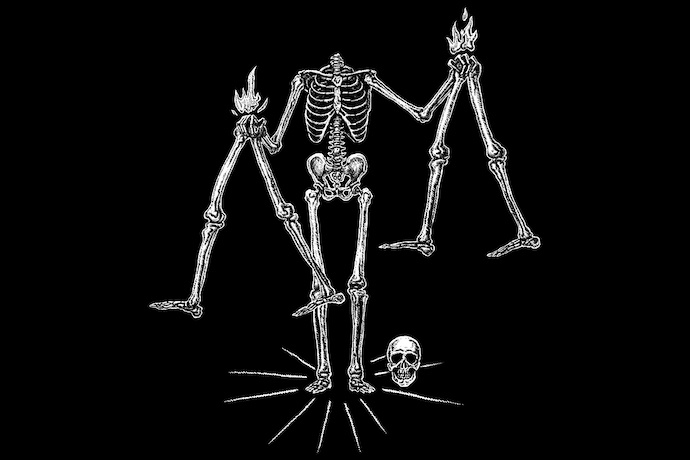
Traditionally, black metal is perceived as a genre based on the expression of sheer, pretty raw emotions, but as years have passed the attitude to black metal changed a bit, as a lot of bands choose a more intellectual… self-aware approach. Do you agree with that? Is it a bliss or a curse for the genre?
Of course, we agree with this statement. In your terms, we have chosen an “intellectual self-aware approach”, well, not to the same extent as our more experienced comrades and teachers, however, we found our place in this subcultural phenomenon. It wasn’t that easy again, to be honest. In the current situation, sometimes we regret that we paid attention to the experiments of Abigor and Deathspell Omega too late, but on the other hand, everything has its time.
So, yes, we believe that development and experimentalism are a “bliss” for Black Metal, because creating a cult out of old canons was/is a dead end. When I hear a band playing the same music they played twenty years ago, I’m completely at a loss.
I was surprised, as you covered Dead Can Dance’s song. How does it fit the album’s central plot?
We just wanted to know how our favorite song by Dead Can Dance would sound in a Black Metal form. And of course, “Emmeleia – Dead Can March” is a provocation totally in the vein of Laibach; the stolen verse of Tomaž Hostnik at the beginning gives a hint to this. The principle of the Laibach art is not to search for a cultural element that is appropriate and consistent with your theme/topic/plot, but to make it like this.
It is worth pointing out that the musical forms of both original and Black Metal-ish versions correspond to the understanding of the theme by their writers. If we use the symbolism/terminology of Donnie Darko, then the so-called Manipulated Dead are dancing in the Dead Can Dance plot, while they are marching in ours – that’s the point.
The idea of the mass return of the marching dead is being implanted through TV series and blockbusters into the minds of the planet’s inhabitants; mass culture really encourages people to believe that dead can march. But you must understand that these dead are not the Manipulated Dead at all, the difference between the Manipulated Dead and the “regular” dead is clearly demonstrated in the Donnie Darko scene, when Donnie has a dialogue with a Manipulated Dead in the cinema while watching The Evil Dead. The Manipulated Dead have their own mission, they carry a message, while the Walking Dead are just walkers. Anyway, this mental set (the mass return of the marching dead) works for the doctrine of Chaos.
Sorry, I don’t see the connection. If I get you right, then “the marching dead” as ordinary indoctrinated or brain-washed people is a symbol of Order on a basic level. A predictable mass which is easy to be controlled and guided. Isn’t it?
Well, if we stay within the social analogy, then maybe that is the case. With one small clarification: “the marching dead” actually are those people who want to be brainwashed, because they themselves have no desires, no dreams, no goals. While if you have any passion, you will resist any brainwashing.
Anyway we are not interested in any social or political parallels or symbols. For us, the dead are guests from the other world, that’s all. Sometimes they have something to say to us, the living, but more often they have nothing to say, they are just walkers. In both cases they come to our world, it is unnatural, totally unnatural, but the Chaos demands it. For the time being this idea is only being put into the minds of scriptwriters and producers, so zombies begin to march on the screen. What will happen next, I don’t know. But all this is not done for nothing.
And I have the same question about another song, “Im Namen des künstlichen Intellekts” (“In the Name of Artificial Intelligence”). Was it so hard to ignore this theme, that you wrote the lyrics about AI? Was there a special event that pushed you to do it?
There was no special event, there was just a genuine bewilderment: do they (AI researchers) really not understand what kind of portal they are opening? It’s not about that some people support AI and some don’t, it’s about that a different reality is opening up beneath our eyes. Sure, I have dreams about what this “new” reality might hold, but I admit that it (the “new” reality) doesn’t care about my dreams, so who cares? Anyway, this mental set works for the doctrine of Chaos as well.
You quote Dostoevsky in your song “Der Zorn” (“The Wrath”). How much does Russian culture influence you regarding Blackdeath? Does it work in some intricate ways and flows in your songs?
Alex, for Cthulhu’s sake, Russian culture has nothing to do with Black Metal. However, I can say that Russian literature has influenced us as individuals, and since these individuals create Black Metal, therefore Russian literature influences our Black Metal. Oops, looks like it really works “in some intricate ways”, but I have no desire to decipher what these “intricate ways” are.
As for Fyodor Dostoevsky, I consider Rodion Raskolnikov (Crime and Punishment), whose quote is used for the “Der Zorn” lyrics, as a Chaos-Gnostic. As well as Alexei Kirillov from Bésy (Demons) by the way. I understand that the comparison is somewhat strained, however, we are operating with very similar ideas I believe: “Am I a trembling creature, or do I have a right!” – these are the very words that the one who carries a particle of Chaos within himself will say to the Cosmos.
Common! You know that I mean. It’s like cultural code most of us have by default, because of school literature programs (just like you said), because of historical background and so on. Like… after years of atheism in USSR, it’s hard to play “true and evil” black metal blaming the Christian church in everything, as there was no church almost for seven decades. Russian true and evil black metal, if we follow the canon laid by the bands of “the first wave of black metal,” could be anti-Soviet black metal.
I was a diligent schoolboy in Soviet times; anyway I hated school. I hated school, I hated the whole school program, I hated Pushkin, I hated Tolstoy, I hated Dostoevsky and so on. I became a worshiper of Dostoevsky’s works when I was already over 20 years old, I read his novels one after another and smoked marijuana a lot. Dostoevsky and marijuana are an explosive mixture, believe me.
The Soviet Union collapsed back in 1991, and almost immediately Christian ideology began to be imposed instead of communist ideology here; actually “perestroika” (1985-1991) prepared and began the “revival” of Christianity in Russia. So Black Metal came to Russia in parallel with the strong process of Christianization. Sometimes we really saw ourselves in those days as “neo-pagan warriors” who resisted the Christian invasion.
But in the whole, I say this again, we, Black Draugwath, did not perceive the church as our main enemy. We were interested in the Universal Evil, and not in some nasty thing to do to the priests of the nearest church. And we didn’t pay attention at all to the “anti-Soviet resistance” in those days, because we believed that Sovietism was dead and would never return. We were wrong.
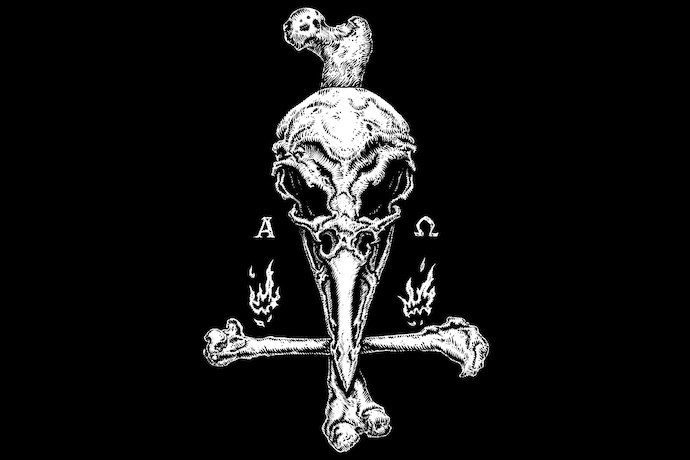
There was news that the Russian church or some government members – I don’t remember – put forward an initiative at the legislative level to prosecute for propaganda of satanism or something like that. Do you see it as a problem, or is it just the self-promotion of politicians?
For a long time now I have tried not to think about what is really behind certain political statements. But I know very well this mixed feeling of uncertainty, fear, passion, courage and fatality, with which I look at the world around us now. It was roughly the same in the late ’80s, back in the Soviet Union, when we drew pentagrams on our jean jacket. Something like that. But it was easier then because we didn’t understand anything. Now, unfortunately, we understand too much. We have returned to the past, but we can’t fix anything.
“Der Zorn” has its industrial vibe, so that reminded me about other of your projects like Cthulhu Biomechanical and more. What’s the news from this side?
Cthulhu the Mighty is sleeping, so I have no news from Him except that it looks like our debut demo Ph’nglui Mglw’nafh Cthulhu R’Lyeh Wgah’nagl Fhtagn (1996) will be re-released on CD soon. That’s all. Honestly, over the past three years we have jammed only a couple of times with material that could be used for one of our Cthulhu projects. So He is really sleeping.
Oh, wait, maybe some “old news” that I keep forgetting to share. A short film called Dolg (Debt) was shot in 2019. An amateur/indie movie or something like that. It used music by Cthulhu from Hallucinations in the Colour Out of Space(2018). The closing credits mistakenly mention Cthulhu Biomechanical because the film’s composer and sound engineer, Roman Bezinovsky, recorded the stuff for Elon Musk Superstar (2019) by Cthulhu Biomechanical; he just mixed up the project names. He composed the main soundtrack for Debt, in the rock genre I guess, while Cthulhu’s guitar part is used only at certain scenes to emphasize the tense atmosphere.
You can watch this movie with English subtitles, the plot is inelaborate, but at least you’ll have a cop, a whore, and a dead man. By the way, if you care, this dead man functions as a Manipulated Dead in some way.
The official press-release states that “thematically, Blackdeath dissect reality through an anti-cosmic lens, revealing Chaos in all things”. Is this definition close to the truth?
This definition is the pure truth, for Chaos’ sake, I demonstrate this in almost every answer. At least, the lyrics to the last song are simply copied from reality, I think that’s pretty obvious. Symbols can be seen in everything. The problem is how to decipher them.
Yes, and you published not only the original, German, lyrics, but also their translation in English. A lot of bands say that it’s the listener who decides what their lyrics say. So, it’s not your option, right?
Well, in fact, we publish our lyrics so zealously just to demonstrate that we have nothing to do with what is attributed to us. We are what we are.
Blackdeath is known in the metal underground, your albums are released and distributed in Europe. Do you see a chance to play live abroad in a nearby future? What are your plans regarding gigs for 2024 / 2025?
Sorry, in these times, it is wiser not to voice our plans.
Black metal is always associated with Evil, and evil takes many forms in black metal songs. Satan, abstract bloodshed, the wrath of heathen gods, Lovecraftian horrors, etc. You know. But in the end all evil is made by humans – by ordinary men in local scale, by alcoholics, drug-addicted miserable bastards, or by politicians on the global scale. Does the glorification of evil mean self-deception in this case?
Actually, this question comes from the ’90s, so I’m answering from the ’90s.
‘…Oh, yes, there is a sort of connexion between Sin with the capital letter, and actions which are commonly called sinful: with murder, theft, adultery, and so forth. Much the same connexion that there is between the A, B, C and fine literature. But I believe that the misconception – it is all but universal – arises in great measure from our looking at the matter through social spectacles. We think that a man who does evil to us and to his neighbours must be very evil. So he is, from a social standpoint; but can’t you realize that Evil in its essence is a lonely thing, a passion of the solitary, individual soul? <…>
‘…You think that sin is an esoteric, occult thing?’ ‘Yes. It is the infernal miracle as holiness is the supernal. Now and then it is raised to such a pitch that we entirely fail to suspect its existence. <…> …Because the true evil has nothing to do with social life or social laws, or if it has, only incidentally and accidentally. <…> …We have quite forgotten the awfulness of real sin.’ <…>
‘Then the essence of sin really is…’ ‘In the taking of heaven by storm, it seems to me. … It appears to me that it is simply an attempt to penetrate into another and higher sphere in a forbidden manner. You can understand why it is so rare. There are few, indeed, who wish to penetrate into other spheres, higher or lower, in ways allowed or forbidden. Men, in the mass, are amply content with life as they find it. Therefore there are few saints, and sinners (in the proper sense) are fewer still, and men of genius, who partake sometimes of each character, are rare also. Yes; on the whole, it is, perhaps, harder to be a great sinner than a great saint.’
‘There is something profoundly unnatural about Sin? Is that what you mean?’ ‘Exactly. Holiness requires as great, or almost as great, an effort; but holiness works on lines that were natural once; it is an effort to recover the ecstasy that was before the Fall. But sin is an effort to gain the ecstasy and the knowledge that pertain alone to angels and in making this effort man becomes a demon.’
This is an extensive and wilfully remixed quotation from The White People by Arthur Machen. Actually, that’s where we started in the ’90s. So, no-no, glorification of evil does not mean self-deception at all. At least for us, Blackdeath.
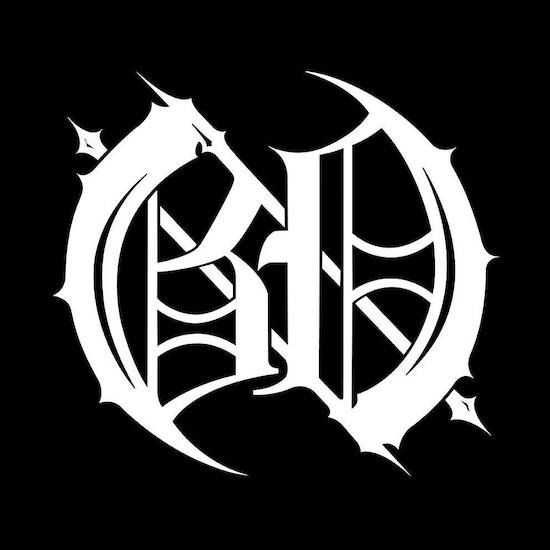
Yet, the path of sin (or Sin) is easy and banal nowadays, as sin became a natural part of mass culture. And any big pop-star, R’n’B frontwoman or rock-macho promote it way more efficiently with their videos radiating lust and the triumph of hedonism than any extreme metal band with the most disgusting artworks one can imagine. So I don’t think that the rules are the same as in the ’90s. Sin is the norm of life more than ever.
Yes, of course, what you are talking about is just a special case. Looks like the counter-culture/sub-culture of any kind constantly gives ideas to the mainstream, which constantly needs fresh ideas to lure the consumer. Therefore, any rebellious idea sooner or later turns into a fashion trend: once tattoos were the prerogative of the criminal world and sub-culture, now all the “stars” make tattoos for themselves. The same with sin.
Okay, and as we speak about the ’90s: Why didn’t any of those few Russian bands that came out at that time become cult?
Well, it depends what scale of “cult” you mean. Some of these bands (including Blackdeath, as shamelessly as it may sound) really got their share of worshipping in the underground. But, of course, not comparing to, just for an example, the French scene. And that is because the Russian bands that were born in those years just copied the Norwegian Black Metal templates in a greater or lesser degree. But to be a cult act, you need to have some uniqueness and originality. As for Blackdeath, we started to cast off the shackles of our enthusiasm for the Norwegian scene too late.
Thanks for the interview, Para Bellum! Let’s hope that we’ll have a chance for another one, if the world as it is will last for longer and Blackdeath will release another album.
Thanks for your questions, Alex. As I said, we’re working on material for a new album, so it’s up to the world to exist. However, even if it continues to exist, it will never be the same again.
https://www.facebook.com/trueblackdeath
https://trueblackdeath.bandcamp.com/music
